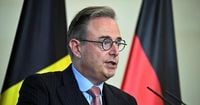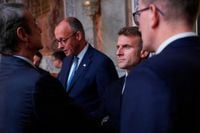European leaders are once again at a crossroads as they debate an ambitious and controversial plan to use frozen Russian state assets to fund Ukraine’s reconstruction. The proposal, first floated by European Commission President Ursula von der Leyen in mid-September, would see roughly $164 billion (140 billion euros) in loans extended to Ukraine, with repayments ultimately recouped through war reparations from Russia. The plan, however, is far from straightforward—and as this week’s summit in Copenhagen revealed, it’s igniting both hope and anxiety across the continent.
The urgency behind the proposal is hard to overstate. Since Russia’s invasion of Ukraine in February 2022, Western nations have frozen about $300 billion in Russian Central Bank assets, with the lion’s share—some $246.9 billion—held in Europe. Of that, a staggering $217.5 billion sits with Euroclear, a Brussels-based capital markets company. According to Euroclear’s recent financials, the sanctioned Russian assets generated $3.2 billion in interest during the first half of 2025, a notable drop from $4 billion the previous year. Yet the principal remains untouched, a tempting resource as Ukraine’s financial needs grow and U.S. support wanes.
“I strongly support the idea,” declared Danish Prime Minister Mette Frederiksen, echoing the growing sentiment among some EU leaders that Europe must step up as Washington signals retreat. Swedish Prime Minister Ulf Kristersson was equally enthusiastic, stating he was “very much in favour” of the plan. But not everyone is so eager to dive in.
Belgium, the country at the center of the debate, finds itself both pivotal and exposed. Prime Minister Bart De Wever has been outspoken about the risks, demanding clarity and collective responsibility from his European counterparts. “I want the maximum of legal certainty. I want solidarity. And I want transparency on the situation in the other countries,” De Wever insisted during a press conference in Copenhagen. He added, “I don’t think this is an unreasonable position.”
The Belgian leader’s concerns are not just rhetorical. Under the Commission’s plan, Euroclear would transfer the frozen cash balances to the EU, which would then issue the loan to Ukraine. Ukraine would only be required to repay the loan after Russia agrees to pay reparations—a scenario most see as unlikely in the near term. If Russia refuses, the risk is that the assets could be considered confiscated, a move that would be illegal under international law. “This manoeuvre is completely unprecedented,” De Wever warned.
De Wever’s metaphor was colorful—and pointed: “The question now is: can we eat the chicken? The first problem, of course, is that you lose the golden eggs if you eat the chickens. If you put the chicken on the table and you eat it, then you lose a golden egg.” The “chicken” is the principal sum of frozen assets; the “eggs” are the interest profits, which Belgium has been transferring to Ukraine—about 1.3 billion euros a year in corporate tax, by De Wever’s estimate.
Belgium’s legal exposure is significant, given that most of the assets are held within its borders. De Wever has asked his fellow leaders for a written guarantee that all EU member states will share responsibility if the plan goes awry. “If we venture into unknown territory, we could be held liable for interest, we could be held liable for damages, and that would drag us into litigation for many years,” he cautioned. De Wever’s six-point checklist for moving forward includes arbitration management, respect for international law, risk-sharing, euro stability, utilization of assets outside Belgium, and the fate of the ongoing G7 loan based on windfall profits.
The legal hurdles are daunting. As Luxembourg Prime Minister Luc Frieden put it, “You can’t just take over assets that belong to another state so easily.” Dutch Prime Minister Dick Schoof echoed the sentiment, urging caution and calling for a thorough review of the legal and financial risks. Even French President Emmanuel Macron, while open to discussion, stressed that Belgian concerns must be addressed and that “seizing the money would be contrary to international law.”
On the other side of the equation, Russia has reacted with predictable fury. Kremlin spokesperson Dmitry Peskov denounced the EU plan as “theft,” warning, “We are talking about plans for the illegal seizure of Russian property. In Russia, we call that simply theft.” Peskov went further, threatening prosecution and retaliation against those involved. “The boomerang will very seriously hit those who are the main depositories, countries that are interested in investment attractiveness.”
Experts warn that Russia could pursue legal action against European nations, but as Timothy Ash of Chatham House explained to Al Jazeera, such proceedings would require Russia to waive its own sovereign immunity—a move fraught with risk and likely to drag on for years, if not decades. Russia could also retaliate by seizing Western assets within its borders, but these are mostly private holdings and not exclusively Western, making the situation complex. According to Russian Central Bank data, foreign assets in Russia totaled $215 billion at the end of 2023, down from $289 billion in 2022, and include investments from China, India, and the Middle East.
There are broader implications, too. De Wever warned that politicizing frozen sovereign assets could prompt non-EU powers, such as China, to withdraw their euro reserves, potentially destabilizing the currency. “If Europe has to pay, and only Europe has to pay, for the Ukrainians and the war, we will need a lot of money,” he observed, noting that Kyiv needs an estimated 60 billion euros annually between 2026 and 2027 just to cover its budget deficit and defense needs.
With the United States stepping back—President Donald Trump has made it clear he views the conflict as Europe’s responsibility—the pressure is mounting on EU leaders to find a workable solution. NATO members have already pledged to increase defense spending to 5 percent of GDP by 2035, but a Ukrainian defeat could force an even faster buildup, straining budgets and risking economic growth.
Despite the risks, some leaders argue that inaction is a greater threat. “It is going to happen because with the US walking away, Europe is left with $100bn-plus annual funding needs for Ukraine,” Chatham House’s Ash told Al Jazeera. The alternative, he warned, could be catastrophic, including mass migration and heightened security threats to Europe.
The European Commission insists that no final decision has been made and that political feedback is still being considered. “We’re open to having such discussions in the context of the G7 meetings,” a Commission spokesperson said, acknowledging the complexity and sensitivity of the issue.
As the debate rages on, one thing is clear: Europe is navigating uncharted waters. The outcome will not only shape Ukraine’s future but could redefine the rules of international finance and sovereignty for years to come.







